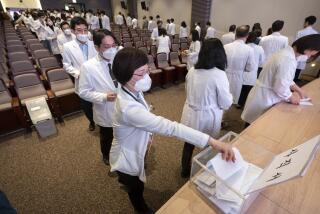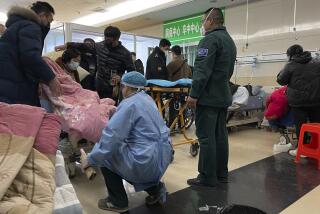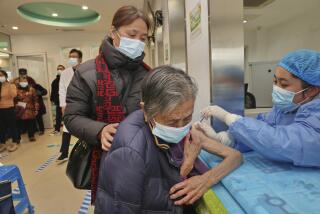Health-Care Crisis Leaves Many City Dwellers Vulnerable
- Share via
WUHAN, China — Since a car accident two years ago, Wang Zhiyou has had surgery 19 times. The scars on his legs, arms and forehead prove it. He has endured a steel rod being inserted into his leg and even survived a botched operation that set back his recovery for months.
But the 50-year-old boat factory employee considers himself doubly lucky--not merely because he lived to tell the tale but because his employer pays his medical bills.
“My company is pretty good. They pay all my expenses,” he said. “And they send some of my colleagues to look after me.”
As China struggles to overhaul the cradle-to-grave welfare system that has sustained citizens for decades, Wang’s good fortune is becoming a rarer commodity in its cities. Complete health-care coverage by the government and state-owned enterprises, almost universal 20 years ago, is provided to just half the urban population today.
Although the urban health-care crisis pales in comparison to that in the countryside, where about 700 million farmers have no financial protection against of illness and injury, the decline in insurance coverage has sent as many as 100 million city dwellers scrambling to find alternatives--or to avoid seeing a doctor if at all possible.
As a result, some public health standards have fallen after decades of encouraging improvements, although the urban situation remains far brighter than that in rural areas, international experts say.
“People are falling through the cracks,” said Michael Wenderoth, a U.S. consultant who has studied the health-care industry in China and helped establish one of Beijing’s newest hospitals, which caters mostly to expatriates. “It’s a major problem for the government.”
Earlier this month, the central government announced that it would begin phasing in a national insurance system for urban workers in the new year. Under the plan, workers would be required to put as much as 2% of their annual incomes into individual medical funds topped off with contributions from their employers. The transition is to be completed by the end of 1999.
Private physicians and hospitals are available in major cities to the well-heeled. But most residents can scarcely afford to visit state-run medical institutions when the money comes out of their own pocketbooks, which makes Wang’s position--full medical coverage by his factory--enviable.
Reclining on his bed in a packed ward of Xiehe Hospital in this industrial city of 7 million people, Wang estimated that his medical costs so far have totaled more than $12,100, a whopping sum in a country with an annual per capita income of $2,800.
Wang described Xiehe Hospital as one of the city’s better ones, despite the crowded conditions, grubby floors and sheets, missing ceiling panels, poor ventilation, occasionally incompetent care and smokers openly lighting up beneath “No smoking” signs.
Although there is no shortage of beds, budget cuts have squeezed urban hospitals hard. Many have been forced to make money by overprescribing drugs or pushing unnecessary, but lucrative, high-tech procedures, according to health experts.
A black market also has flourished to skirt government regulations that have kept some prices for medical services and drugs artificially low. Patients with money or good connections can secure private rooms, bypass long lines of people waiting for treatment and receive better service by greasing the palms of doctors and hospital officials.
The result: Even state-provided medical care increasingly has moved out of reach for greater numbers of urban residents.
“While many countries are moving toward a curative health system that is financed publicly but provided largely privately, China is moving in the opposite direction,” concluded a report recently issued by the World Bank.
The growing number of workers laid off from state-owned enterprises, plus China’s huge “floating population”--about 100 million migrants who have left the countryside to seek work in the cities--probably will further strain the urban health-care system, experts say.
“It will take many years to set up well-functioning insurance systems that cover the majority of the urban population,” the World Bank said in its report. “The crucial question is: Does China have the resources and the will to accomplish these goals in the face of other pressing economic and social issues?”
More to Read
Sign up for Essential California
The most important California stories and recommendations in your inbox every morning.
You may occasionally receive promotional content from the Los Angeles Times.














